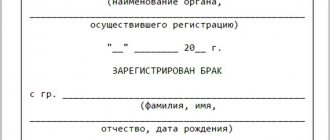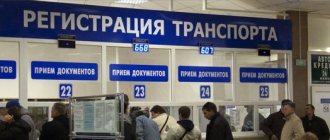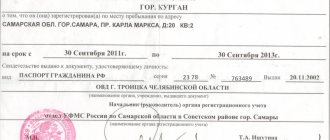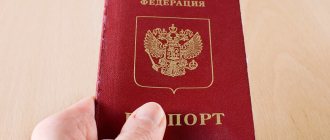How to apply for registration and temporary registration at the place of stay in the Russian Federation. What is the difference between place of residence and place of stay and what are the rules for legalizing staying at a certain address. Documents for registration and procedure for obtaining registration.
Everything related to registration and temporary registration at the place of stay. Back in November of that year, the Russian government somewhat simplified the registration procedure.
This concerned registration at the place of stay (in particular temporary registration), as well as registration at the place of residence (in particular permanent registration). Some amendments have been made to the Rules for registration, as well as deregistration of Russian citizens at the place of residence, and, of course, at the place of stay. For convenience, we will refer to this document as “Resolution No. 885”.
In many cities and other localities, documents are processed, as a rule, in special bodies of the Federal Migration Service. In villages and villages, this work is entrusted to local governments. However, first it is necessary to clarify how the concepts differ from each other: place of residence and place of stay. Thus, a place of residence is a place where a citizen permanently or primarily resides as a certain owner.
A rental (sub-tenancy) and social tenancy agreement may be concluded with him. However, this may also be for other reasons, that is, he lives in a residential building, in an apartment, in a service residential building, in specialized houses (a shelter hotel, a hostel, a house of a flexible fund, a special house for the lonely or elderly, a boarding house for various disabled people, for veterans).
The place of residence is a place where a citizen resides temporarily. So, it could be a hotel or a sanatorium. In addition, residential premises that are not considered the place of residence of a citizen include a dacha or a house in a village.
Registration at the place of stay (in particular temporary registration)
Citizens who arrived for temporary residence (on a visit, at a dacha) for a period of more than 90 days must, after the expiration of the above period, temporarily register at the place of stay (namely, register).
To do this, they will have to contact certain officials who are responsible for registration and submit the necessary documents:
- This is a passport (or a document replacing it).
- This is an application (in the prescribed form) for registration at the place of residence.
- this is a document (the main basis for temporary residence), for example, a rental agreement (or sublease), social tenancy of a certain residential premises, or an application from the person who provides the citizen with residential premises.
This provision remains unchanged. The novelty, however, is different: now, in order to inform the necessary authorities about your arrival, it is not at all necessary to personally come to a certain territorial body of the FMS or to the local administration; it will be enough to send a notification by mail or via the Internet.
Registration of citizens at the place of their stay in residential premises, however, which is not their permanent place of residence, is carried out, as a rule, for a period determined by mutual agreement. This is an agreement with tenants, as well as all family members currently living with them (even those temporarily absent, for example, if they live in various municipal or state housing buildings). This is an agreement with the owners of residential premises.
This is an agreement with the boards of housing construction or housing cooperatives, when members of cooperatives will not be the owners of these residential premises.
As a rule, the owner of an apartment or house in the village where you come on vacation needs to contact a special registration authority. These authorities, within 3 days from the date of receipt of all documents, register the data of citizens, after which they issue them a certificate where registration at the place of stay is recorded.
In addition, at the request of a citizen, a certificate of registration at their place of residence by the registration authority can be sent by mail to the address of a specific residential premises, which is indicated in the application for this registration at their place of residence. The owner (that is, the tenant) of the residential premises is sent a mandatory notification of the registration of this citizen within 3 days.
As for the registration of minor children at the place of residence of their parents (adoptive parents or guardians), it is carried out regardless of the consent of the tenants or owners of the premises.
A citizen who comes to rest in a sanatorium, boarding house, or hospital is registered by the administration of these institutions on the basis of documents that prove his identity. Moreover, without any deregistration of a particular citizen already at his place of residence (therefore this is a temporary registration).
Social services at the place of residence
Russians still receive most social services at their place of registration. The main part of the “social package” is schools, kindergartens, and outpatient medical care.
Providing places in preschool institutions is the task of local administrations. In St. Petersburg, the process is formalized: residents have the opportunity to get on the waiting list through the MFC or the government services portal. At first, you may be offered a kindergarten at the other end of the area. But there is always a chance that places will become available in the nearest preschool institutions and it will be possible to transfer. In the region it’s more difficult: you have to negotiate with managers and knock on the doorsteps of municipal administrations.
In the suburban areas of St. Petersburg, where mass housing construction has begun in recent years, the situation with social infrastructure, to put it mildly, is not good. Residents of “border” regional areas are constantly faced with the fact that there are not enough kindergartens there, and their children are not accepted into the city ones. And this is really a problem.
Regional registration will not be an obstacle to attaching a compulsory medical insurance policy or getting an appointment with a doctor in a city clinic: medical services under the basic package are provided on an extraterritorial basis. But in “border” areas, incidents of this kind occur: an ambulance arrives at a city house almost immediately, and to a regional house located next door – within forty minutes from the nearest regional center.
Registration at place of residence (in particular permanent registration)
A citizen who has changed his place of residence must, no later than seven days from the day of his arrival, apply to certain officials for registration, and also submit the following documents:
- this is a document that proves his identity.
- This is an application that can also be submitted online.
- this is the basis document for permanent occupancy of a residential premises (for example, a social tenancy agreement, when the apartment is municipal, or a certificate of state registration of ownership of this residential premises).
Finally, some more minor innovations: “Registration authorities register citizens at their place of residence within 3 days from the date of receipt of all necessary documents. A mark in the passport of a certain citizen or the issuance of a registration certificate at the place of residence of a person who has not yet reached the age of 14 must be made on the day the document is received by a special registration authority.
This document must prove identity or be the basis for moving into this residential premises.” Consequently, in order to obtain a permanent residence permit, you will have to come to a special body of the Federal Migration Service or to the local administration in order to receive the corresponding mark in your passport.
The registration and registration policy in the country presupposes that each resident, both permanent and temporary, has registration at the place of residence or stay. How to register at a place of permanent or temporary residence, and are there any special features if the place of registration is a private house?
History and price of the issue
Registration at the place of residence (in common parlance – propiska) is an institution that flourished in Soviet times. Without registration it was impossible to get a job, and without work - registration. It turned out to be a vicious circle. To gain a foothold in Moscow or Leningrad, they had to enter into fictitious marriages, get a limited job - for example, as a janitor - or work on high-impact construction sites. Apparently, it was from those years that the dream of registration in a metropolitan metropolis and the fear of losing it live in the genetic memory of Russians.
Now everything is simpler. Registration as such was abolished in 1993, replacing it with registration at the place of residence. Within 90 days after moving, you are required to register. Fictitious marriages and work dorms are a thing of the past. But even those who are seriously limited in funds are willing to overpay for the opportunity to register in St. Petersburg.
Let's estimate how much this amounts to. So, according to BN analysts, a square of secondary housing in St. Petersburg is estimated at 109 thousand rubles, in the Leningrad region - at 57 thousand rubles. True, the Leningrad region is a huge region, so talking about average prices is incorrect.
But there are territories with a comparable level of urban development - the regional Vsevolozhsk and urban Pushkin districts. The first contains the famous St. Petersburg satellites throughout Russia - Murino - Novoye Devyatkino and Kudrovo. In the second, the lion's share of housing market offers is represented by the Shushary, Lensovetovsky and Slavyanka arrays.
The named territories of new regional and urban development have a similar set of social, infrastructural and transport problems. But the average price per square meter on the secondary housing market in the Vsevolozhsk region is 81.8 thousand rubles. (and this is the most expensive regional district), in Pushkinsky - 92 thousand rubles. Thus, under comparable conditions, you have to overpay 10 thousand rubles for the possibility of city registration. per square meter. We looked at the secondary market, but buyers of new buildings are also focused on this or a slightly more significant difference.
How to register in a private house
What do you need to register in a private house? In order to be able to obtain registration in a private house, it is first necessary that it has residential status and there are no obstacles from third parties (if the person being registered is not the sole owner). Because the owners of the building and registered occupants must authorize the registration in writing. If there are no obstacles to registration, the applicant will be required to collect documents and submit them to the competent authority for consideration and registration.
Local area of a private house: boundaries, maintenance
The presented meeting must be held as a meeting of interested parties. It is also possible to conduct negotiations for each participant separately. Interested parties must be given notice at least four 30 days prior to the meeting. If they refuse to attend a meeting, they are considered to have been given notice of the meeting. If interested parties have not expressed any objections, there are no obstacles to boundary delineation. As a result, it is necessary to create a corresponding entry in the land surveying act.
After carrying out these manipulations, a notification is given.
List of documents
The documents included in the registration package depend on its type. So, to register temporarily you need to:
- statement;
- identity document - passport;
a document certifying the existence of grounds for moving in (court order, rental agreement, sublease, etc., certificate of housing ownership, statement from the owner of the residential property, with which the latter gives consent to register the person applying for registration).
Read more in our article about the issue. A separate material discusses the issue. ⇐
Permanent registration will require collection and submission of:
- application (the form of the application is determined by regulation);
- passport, and for young children - birth certificate;
- grounds for moving in;
- address sheet for departure from an apartment, hostel, house, etc. At the previous place of registration it is obtained after deregistration.
Procedure for registering in a new home
To register in a new private house, the applicant must perform a series of sequential actions and collect certain documents. So, you will need:
- Receive the commission’s conclusion, register the house and complete all the necessary documents, first of all, register the rights to the house.
- Deregister at the previous address where registration was made. If the re-registration concerns a man, then the latter is also deregistered at the military registration and enlistment office at the previous address and registered at a new one;
- Citizens change their registration by submitting an application through the local passport office, FMS office, or MFC. Village residents turn to the passport officer at the local administration.
- An exhaustive list of documents must be attached with the application: passport, document serving as the basis for registration, birth certificate, etc. Requesting documents not provided for by law is illegal, violates the rights of the applicant and is not mandatory.
Availability of these documents is a necessary condition for registration.
Registration of Russian citizens is not subject to a fee, but when a foreigner applies for registration, the latter must pay a fee of 200 rubles and provide a receipt for its payment with a package of documents.
Law on the local area of a private house
You can determine the size of the local area of an apartment building using the formula used by specialists. However, this is not possible for personal plots. In order to determine the dimensions yourself, the following conditions must be met:
- draw up a plan of the established boundaries of the territory;
- the present objects must be marked on the plan;
- the local area is designated as municipal property;
- it must be taken into account that household plots of the same size can have adjacent areas of different sizes;
- make sure that the appropriation of additional land does not violate the rights of neighbors;
- contact local authorities and register ownership.
This is interesting: Sample act of acceptance of transfer of land with a house
There is a high probability that the government agency will change the size of the plot. How to register ownership of the local area? The adjacent territory of a private house can be registered as property. Photo No. 4 Based on the information presented, we can conclude that the inner part of the site, fenced off by a fence, is the property of the owner of the house. In turn, the local area mainly belongs to the municipality.
In order to have full rights to dispose of the site, you must have documentary evidence. It is worth considering that several people can own it at the same time. Registration of the local area of a private house is available in the form of ownership or lease.
To complete this, you need to prepare a certificate of state registration of the right to the house and land. You can also provide a purchase and sale agreement with registration in the BTI. In summer, the area is watered and the paths are swept. All work is monitored. It is necessary to take care of cleaning ditches for water drainage. If the roads are not municipal, then residents have the right to close the territory with a barrier.
Apartment owners can rent out part of the plot and spend the resulting profit on general household needs. The decision made at the meeting will be justified and accepted. If the number of votes is at least half.
Responsibility also rests with the management company or HOA. If an accident occurs, the judge will order the company that maintains the territory to pay damages. What is meant by site maintenance? — Providing repairs to structures and buildings located in the local area. It is also worth remembering that apartment owners do not have the right to restrict access to the building adjacent to the maintenance specialist.
Registration in a house without ownership rights, about ownership shares
Registration and ownership are two different concepts. Having a residence permit does not give you ownership. The latter is certified by a certificate and registered in Rosreestr. Registration without ownership rights does not guarantee any rights to the tenant to the residential premises.
Owning a share in the ownership of a residential building does not impair the rights of such an owner. The latter can dispose of his property at his own discretion, and accordingly, become registered. In this case, registration is carried out without the consent of anyone, if its part is isolated (separate exit, etc.). It will be necessary to agree on this issue with the other owners when the shares are not allocated in kind, i.e. the room is not isolated.
Approval is not required when a minor child is registered. They are prescribed by law in residential property without taking into account the opinions of third parties.
Is it possible to register in an unfinished house?
For people who are in the process of construction and do not own any other housing, the question is relevant: “Is it possible to register in a house under construction?”
Registration in an unfinished private house is not possible. The condition for obtaining registration in a built house is its acceptance by the interdepartmental commission. This also applies to the case when the village or area in which the house was built has not been put into operation, but some of its houses have been accepted by the commission. The owners of such houses can register in them, and the basis for registration will be a shared construction agreement.
There are cases of registration in houses that actually no longer exist (destroyed due to old age). This applies primarily to houses in rural areas. Before purchasing a plot in a village for building a house, it is worth checking whether there are registered residents at the address where the purchased plot is located. If there are any, then you will need to contact the FMS to get such a tenant discharged. An applicant for such an extract may be asked to provide an opinion from an interdepartmental commission on the absence of a residential building on the site, or a court decision that registration at this address is impossible.
When purchasing a house in a rural area for the purpose of permanent residence and, accordingly, registration, it is necessary to first clarify the status of the building, which must be “residential building”. Only with this status is permanent registration in rural areas possible.
The house itself must be built on a site whose intended purpose is the construction and maintenance of a residential building.
Local area in a rural house
The land management company will determine the size of the plot and develop a project in accordance with which the allotment will be carried out. The city council will make a decision on the transfer of the territory. An act of ownership will be drawn up. The property right should be registered in the Unified Register. You will not be able to take back your territory, no matter in which contact the authority if you do not privatize the site. If the residents are the rightful owners of the land around the house, then no one will build anything on the site without their permission. If the land is registered as a property, it will be assigned to citizens in equal shares, but taking into account the occupied area.
Registration in the village - pros and cons
Living in the village has its pros and cons.
The advantage of registering in the village will be spending on individual items. Thus, taxation and other mandatory payments depend on the place of registration. In particular, compulsory car owner liability insurance for rural residents is much less.
The disadvantage of such registration is the difficulties in social services (medical services, kindergartens, schools, etc.) in rural areas there are no alternatives to such institutions.
the benefits on one side of the scale
. When registering in the house, you will be able to use the services provided to registered citizens:
- Local clinic.
- Receiving a pension.
the imperfections on the other bowl.
:
- The cost of maintaining the house increases: you will have to pay tax on it as on a residential premises.
- The risk of losing regional additional payments (for example, for Muscovites).
- A country house may not have its own individual address: neither a street name nor a serial number.
- Lack of necessary infrastructure.
Now see for yourself: what outweighs?
Registration in the village
I built a house, but I live in the city. I will probably not move to the village for permanent residence any time soon. Now I’m thinking about the question - where is it “more profitable” to be registered? And I realized that I still can’t answer many questions. For example, with a village registration it is cheaper to pay OSAGO. But what about medical care? What to do with any registration actions (birth of a child, car registration) - go to the regional center?
Now you can choose any hospital, just write a transfer application.
What documents are needed?
Registration in a private house: we will analyze the necessary documents by type of registration.
For constant
Procedure for obtaining permanent registration:
- Leave your previous place of residence.
- Upon arrival at your new address, submit documents within a week.
If you didn’t manage to check out of your previous living space, then in a new place in one department of the Federal Migration Service you can do both: check out and register!
The documents for registration in a private house are as follows:
- Statement ( and ).
- Passport or birth certificate (for persons under 14 years of age).
- Grounds for moving in.
- Departure address sheet (form. 7) ( and )
For temporary
Temporary registration is issued in the event that you do not live at your permanent place of residence for more than 90 days
.
How to register and what do you need? To do this, you need to write an application, provide a passport and grounds for moving in.
There is no need to leave your permanent place of residence.
The registration certificate can be given to you at your request or sent to your place of registration.
Documents giving the right to move in
These include:
- Application from the owner allowing this citizen to live in his living space.
- Housing rental agreement.
- Personal property.
- A court decision granting the right to use the premises.
A citizen has the right not to present documents (but indicate their details) providing grounds for moving in, if this information is contained in government agencies.
Then the registration service independently receives the necessary information from the relevant authorities and registers the person at the new address.
Send it by mail!
You can also register at your place of residence by sending documents by email
. This opportunity is provided by the website of electronic services.
Here you fill out an application in form No. 1PR mentioned above, which indicates personal data and information about the owner of the house.
Next, an arrival sheet is drawn up (form 2). (, )
When registering for more than 9 months, you will have to fill out another statistical sheet (Form 12P). ( And ).
Copies of the following documents are sent:
- grounds for move-in certified by a notary;
- applicant's passport (birth certificate for children under 14 years of age);
- passports of the owner of the house.
Within three days you will be invited to the registration department
so that you sign and show the original documents that you sent. If everything is correct, you will receive a registration stamp.
After receiving an invitation from the FMS, you must come to the place of registration within three days
! Otherwise your application will be cancelled!
Where to go?
Two types of registration are recognized
:
- At place of residence (permanent).
- At the place of stay (temporary).
Both types of registration in any region for all categories of citizens are carried out by the Federal Migration Service.
Basic law that regulates the registration process
– Government Decree No. 713 “Rules for registration and removal of citizens of the Russian Federation...” dated 07/17/1995, which was updated several times: 04/23/96, 02/14/97, 04/23/96, 03/16/2000 and 08/14/2002.
Cost and term of the issue
Registration for Russian citizens is carried out without paying a fee
. If you are liable for military service, then register with the military registration and enlistment office.
For permanent registration you must submit documents within 7 days
, for temporary registration - no later than
90 days
. When receiving an invitation by mail, you must appear at the Federal Migration Service within three days.
Time for registration by FMS authorities: up to 3 days
, if necessary, provide additional information –
up to 8 days
.
Is it possible to register if there is no house at all or it is not completed?
If the construction of a house is unfinished (for example, on an individual housing construction plot), it is impossible to register in it.
For registration , it is necessary that the house be accepted by an interdepartmental commission
. If this happens, the necessary stamps and signatures are in place, then minor deficiencies in the construction will not prevent you from registering at the dacha.
There may be an option when your district or village has not yet been put into operation, but your house has already been accepted by the commission, then registration in a new house is carried out on the basis of an agreement of shared participation in construction
.
Registration without a home - does this happen? Yes, if you buy a plot, for example, in a village where there is no house (it was destroyed by old age or natural disasters), then you need to check ahead of time to ensure that no one remains registered there.
A person cannot have a residence permit in a non-existent house
. But if this has already happened, then the FMS authorities are obliged to discharge all residents from this area.
For this you may need:
- Conclusion of the interdepartmental commission on the lack of residential space on this site.
- A court decision on the impossibility of registration in the territory in question.
If you decide to buy a house, check
so that it is designed as a living space. It must be built on an area intended for individual housing construction and have all the necessary communications.
Today we will try to cover all the main points related to living in a private house. What documents are required for this? Is it possible to register a share of a house and temporarily register in a dacha? Finally, where should the relevant petitions be submitted? You will find answers to these and other important questions related to registration in this article.
Registration in a private house is possible
Technically, registration in a private house, either located within the city or built outside it, is possible. However, legal regulations require that the premises chosen as permanent housing meet certain requirements.
So, for example, you cannot register on a site that is still being prepared for development or in a private house that has not been officially put into operation by signing the corresponding act.
It is also impossible to register in a building that is not connected to the gas, electricity and sewerage systems. For this reason, registration in private country houses in villages is also prohibited (there is even a separate resolution on this subject in the current legislation).
The registration procedure itself can be carried out only after the applicant is deregistered according to the previous one. Men, in this case, will also have to change the military registration and enlistment office. For Russian citizens, registration in a private house is free, like any other. Before registration, a foreigner will be required to pay the appropriate state fee in the amount of two hundred rubles.
An application for registration is submitted to the local passport office, the nearest FMS office or the district administration office (if we are talking about rural areas). In this case, the application itself will need to be accompanied by a whole package of documents necessary for the registration procedure:
- (for foreigners – foreign passport and current visa);
- an extract from the house register indicating the number of persons living in the same area as the applicant at a given specific moment;
- all minor children of the applicant;
- Rosreestr certificate confirming ownership rights to the private house specified in the application (and, if there is one, to the land plot on the territory of which the building is located) or a social tenancy agreement for municipally owned housing;
- when registering on the territory of someone else's residential property (for example, in a rented premises or with relatives) - documented consent to move in, signed by the actual owner of the premises.
It is important to understand that any documents not included in the list above are not required for registration. The requirement of a FMS employee to submit some additional papers for registration, as a rule, is nothing more than his personal initiative and an attempt to delay the registration procedure.
So, for example, an applicant should at least be wary and try to defend his rights if, in addition to the listed mandatory documentation, he is required to present:
- residence permit (relevant for foreigners);
- income certificates and relevant extracts from personal income tax;
- tax returns;
- for payment of utilities;
- Marriage certificate;
- military ID;
- a separate document confirming the consent of the owner of a private house to register his minor children together with the applicant.
If, after refusing to submit the above-mentioned optional documents, the FMS employee refuses to consider the applicant’s appeal, the latter has the right to file a complaint with a judicial authority. Similarly, a citizen can do so even if his application was nevertheless accepted, but, for some biased reasons, not approved.
If the appeal process is successful, the applicant will be registered in a private house on the basis of the relevant administrative act.
Is it possible to register in an unfinished house?
It is almost impossible to register in an unfinished house
Having purchased a plot of land and begun construction on it, some citizens naively believe that the registration permit is already in their pocket. This is wrong. According to current legislation, the fact that a particular territory is personally owned does not at all imply the right to freely register on it.
However, if there is some kind of residential premises on the acquired plot, for example, an unfinished house, there is still a chance to register there. True, in order to use it, the owner must make sure that the building fully complies with the requirements stated in the law:
- The house is suitable for living.
- Construction work on the construction of its structural elements (floor, walls, roof) has already been completed.
- All necessary supply systems (water supply, sewerage, etc.) are connected.
The land plot on which the residential building is located was initially intended for development and resettlement of citizens and is not intended for agricultural needs.
A special state commission is appointed to check the construction for compliance with the requirements for residential premises. If all legal requirements have been satisfied, the owner of the premises is issued an act of putting the private house into operation.
With this document you can already go for registration with the Federal Migration Service. If government officials have no other reasons for refusal, registration in an unfinished house will be carried out.
Law on the maintenance of local municipal territories in rural areas
What are the legal boundaries of the local area? I think they are different in each region. Law. The adjacent territory of a private house is defined in accordance with the legislation of the Russian Federation as a plot of land that is attached to the building.
Infill development. Entry and exit of trucks to the construction site is carried out through the courtyard of neighboring houses! Is it legal? The loot is entered into the right offices - that means everything is legal. In theory, what I quoted under Article 16 of the introductory law on the Housing Code of the Russian Federation is that the LOCAL ADMINISTRATION ITSELF SHOULD KNOW what it has cadastred or not. this is a duty. for homeowners - such local area will be transferred into ownership free of charge. If the local area is listed on the cadastre as common property, feel free to put up a fence.
The entry area must be fenced off during construction. The legislation does not have a clear definition of the local area next to private residential buildings, but usually every owner of such a building has to deal with this concept. It is impossible to build a house on land that is not registered as a property.
A plot and a building are two different objects, each with its own cadastral number, but at the same time they are inextricably linked with each other. The local area is considered an important area, since it is used for carrying out utilities, creating approaches and entrances, as well as for erecting various small buildings necessary for life.
The land can not only be the personal property of the home owners, but can also be leased from the municipality. To do this you will need:
- Certificate of state registration for houses and land (since 1998);
- Purchase and sale agreement with registration in the BTI (until 1998).
Individuals are required to contact local authorities. According to the law, only they are involved in considering this issue. You need to write a statement and attach confirmation that the place is abandoned. A response, depending on the condition of the site, will be received within 18 days. If, after considering the question, a positive answer is given, then the land ownership is entered into the unified register. This is how it will be registered. Land surveying principles Legislation regulates land surveying issues. The procedure involves establishing the boundaries of the local area of a house in the private sector. The work is based on the following principles:
- Everything is consistent with the persons who have the right of ownership to the adjacent plot.
According to Art. 65 for land a fee is charged, the amount of which is determined by the terms of the lease. All principles are regulated by the Government of the Russian Federation and local authorities.
The right to lease or own may be denied if:
- Communication lines pass through the site;
- As a result of the lease, the width of the street will be reduced;
- Historical and cultural sites are located near the site;
- The site has other owners and their permission has not been obtained.
Arrangement An important part of maintaining a house in the private sector is the improvement of its territory. It is advisable to create a site plan and place everything on it as you wish.
This is interesting: Purchase of land plots in the Tula region
About ownership shares and registration in part of the house
To register in a private house you will need a package of documents
When owning housing as a shared owner, a citizen also has the full right to register on the territory that belongs to him. In this case, the registration documents do not indicate the entire building, but only a part of it. Are there any difficulties in obtaining such a registration?
If the part of the housing owned by the applicant is isolated from the rest (has its own entrance and exit, load-bearing walls, etc.), he has the right to register on the territory that belongs to him without anyone’s consent.
If this condition is not met, those wishing to register will have to take into account the opinion of the other owners of the premises. This rule does not apply to citizens under 18 years of age. These can be registered on the living space belonging to the parents without anyone’s consent at all.
Law on the local area of a private house
Road work can be carried out by a specialized company employing qualified personnel. Asphalting involves carrying out a set of works that are carried out after all documents have been agreed upon with customers. The complexity of the coatings will depend on the category of the site. The work is carried out using various materials and technologies. Specialized company:
- will remove the old layer of asphalt;
- prepare the surface;
- will lay a new layer;
- will remove debris after completion of work.
If the company has a good reputation, you can count on receiving a guarantee. In order for asphalt to last for a long time, high-quality materials must be used. After installation, the seams must be treated with a special emulsion that has a bitumen base.
Penalty for unmown grass on the property? What can be the fine for unkempt land? Is this your land? Let's all go! Housing Code of the Russian Federation, Town Planning Code of the Russian Federation, Tax Code of the Russian Federation, Federal Law of July 21, 2007 185-FZ On the Fund for Assistance to Reform, the plot on which the house is located and do not contain any mention of the local area. What's the fine? They can only if some weeds are dangerous, they will ask you to remove them. This is a regional fine for each region.
This is interesting: Will for a land share
The fine for uncut grass on a site, for example in Bruges, can reach 400 euros. This is if hemp...
Therefore, when purchasing real estate, you need to consider what you can take for use. To do this, you need to create a plan for the natural boundary of the site and plot all the objects that are required for the operation of a private house.
The plan must include a designation of the area that is municipal property. Please note that even with the same layout of two properties, the configuration may differ.
It is necessary to consult with other owners whose property is located nearby. Then you can go to the local government to formalize the ownership of the territory.
Design Features It is advisable to own or lease part of the land that is located near the site.
About temporary registration in a private house
This case differs from all those described above in that in order to temporarily register in a private house, the applicant is not required by law to be deregistered at his place of permanent residence. Moreover, completing the appropriate documentation only makes sense if the citizen intends to live at the new address for a long period of time (that is, longer than 90 days).
How much will the registration procedure itself differ for this case? Actually, not much. To obtain temporary registration in a private house, the applicant will have to submit the following documents to the local FMS office:
- passport of the citizen moving in;
- homeowner's passport;
- arrival address sheet;
- for occupancy, signed by all other residents of a private house;
- corresponding to the occupancy, written by the actual owner of the residential premises in strict accordance with the norms established by law.
Is it possible to register at the dacha? Look for answers in the video:
Documents for registration in a private house and features of the procedure
Hello. I want to register in the house I built. The FMS refuses. They say registration at the dacha through the court. But this is my situation. I received a city plan that says - single-family residential building, gardening, etc. Then a building permit. Built a house. She put it into operation, assigned a single address to the land with the house, filed a declaration about the house, in general, with the permission of the city, she did everything as expected. Still received a refusal. She filed a lawsuit. The judge requires a certificate from the housing commission that the house is suitable for habitation. The commission sends it for examination. But the examination costs 100 tr. I have a house passport where it says that the house is suitable (foundation, concrete house, electricity, water, sewerage) and was put into operation this year. What is the commission? For what? The lady from the commission speaks. There is no time to get acquainted with the plan and my papers. Like a certificate and that’s it. I don’t have the opportunity to get a certificate, but I have three children without registration and my mother is a pensioner. Can I register in a house without a commission?
As already mentioned, registration and ownership are not the same thing. If you are the owner (or co-owner) of a home, you can register in it without asking anyone for consent. However, if you decide to register someone in your home, you will need confirmation that all other owners are okay with it.







